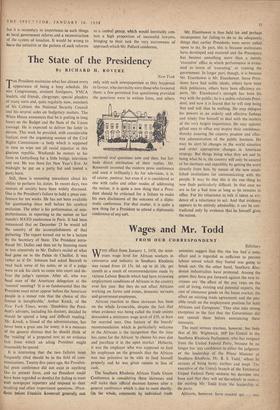The State of the Presidency
By RICHARD H. ROVERE New York
THE President maintains what has almost every appearance of being a busy schedule. He sees Congressmen, eminent foreigners, YMCA leaders, old friends, clergymen, special pleaders of many sorts and, quite regularly now, members of his Cabinet, the National Security Council and his several aides on budgetary matters. The White House announces that he is putting in long hours on the Budget and the State of the Union message. He is expected to deliver the latter in person. This week he presided, with considerable fanfare, over the organising session of the Civil Rights Commission—a body which is supposed in time to wipe out all racial injustice in this glorious republic. Weekends he motors to his farm in Gettysburg for a little bridge, television and rest. He was there for New Year's Eve. At midnight he put on a party hat and tooted a party horn.
Still, there is mounting uneasiness about his ability to perform his duties. In recent days, two sources of anxiety have been widely discussed. One is the President's failure to hold a press con- ference for ten weeks. He has not been available for questioning since well before his cerebral occlusion. The other is his performance, or non- performance, in reporting to the nation on last month's NATO conference in Paris. It had been announced that on December 23 he would tell the country of the accomplishments of that gathering. The report turned out to be a lecture by the Secretary of State. The President intro- duced Mr. Dulles and then sat by listening more or less attentively to Mr. Dulles's recital of what had gone on in the Palais de Chaillot. It was rather as if Dr. Johnson had asked Boswell to read back some of his notes, or as if a judge were to ask his clerk to come into court and de- liver the judge's opinion. .After all, who was head man of the American delegation at the 'summit' meeting? 'It is so fundamental that the President must never appear before the American People in a minor role that the choice of this format is inexplicable,' Arthur Krock, of the New York Times, wrote. 'Doubtless the Presi- dent's advisers, including his doctors, decided he should be spared a long and difficult reading.' Mr. Krock, a friend of the administration, has never been a great one for irony; it is a measure of the general distress that he should think of the 'reading' of a prepared text as an arduous task from which an ailing President might reasonably be spared.
It is interesting that the two failures. most frequently cited should be in the field of com- munications. Twenty-five years ago, the Presiden- tial press conference did not exist in anything like its present form, and no President could have been regarded as derelict for failing to meet With newspaper reporters and respond to 'their needling and often impertinent questions. (Presi- dents before Franklin Roosevelt generally met only with such newspapermen as they happened to favour, who inevitably were those who favoured them; a few permitted free questioning provided the questions were in written form, and others answered oral questions now and then, but for- bade direct attribution of their replies. Mr. Roosevelt invented the modern press conference and used it brilliantly.) As for television, it is, of course, postwar, but even if it is considered as one with radio and other modes of addressing the nation, it is quite a new thing that a Presi- dent should be criticised for a failure to make his own disclosures of the outcome of a diplo- matic conference. For that matter, it is quite a new thing for a President to attend a diplomatic conference of any sort. Mr. Eisenhower is thus held lax and perhaps incompetent for failing to do or do adequately things that earlier Presidents were never called upon to do. In part, this is because institutions have developed and matured and the Presidency has become something more than a merely 'executive' office in which performance is evalu- ated in terms of 'executing,' or running the government. In larger part, though, it is because Mr. Eisenhower is Mr. Eisenhower. Some Presi- dents have had noble ideals, others have been slick politicians, others have been efficiency ex- perts. Mr. Eisenhower's strength has been his way with the public; he is a public-relations Presi- dent, and now it is feared that he will stop being that and will thus be nothing. He may delegate his powers in an orderly and effective fashion and wisely free himself to deal with the matters of the very largest importance. He may appoint gifted men to office and inspire their confidence, thereby assuring the country prudent 'and effec- tive administration of the public business. He may be alert to changes in the world situation and order appropriate changes in American strategy. But things being what they are and he being what he is, the country will only be assured of his alertness and capability by getting the word directly from him, by means of the now estab- lished institutions for communicating with the people. It may be that this is the one thing he now finds particularly difficult. In that case we are in for a bad time as long as he remains in office. For his reluctance to talk is taken as evi- dence of a reluctance to act. And that evidence appears to be entirely admissible; it can be con- tradicted only by evidence that he himself gives the nation.


































 Previous page
Previous page